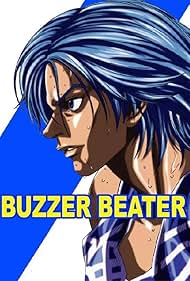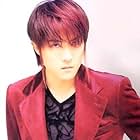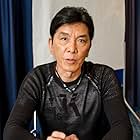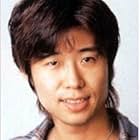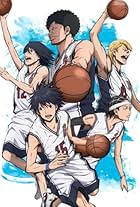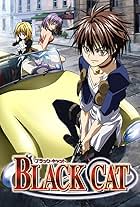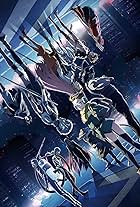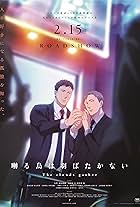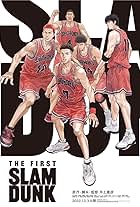Aggiungi una trama nella tua linguaHideyoshi lives in New York but is homeless. But he's been drafted into a pro team. Once there was a time when human people dominated the the Basketball game, but now the Alien race have tak... Leggi tuttoHideyoshi lives in New York but is homeless. But he's been drafted into a pro team. Once there was a time when human people dominated the the Basketball game, but now the Alien race have taken over it and Hideyoshi and his team want to change that. They have to compete in the Spa... Leggi tuttoHideyoshi lives in New York but is homeless. But he's been drafted into a pro team. Once there was a time when human people dominated the the Basketball game, but now the Alien race have taken over it and Hideyoshi and his team want to change that. They have to compete in the Space League to bring the game back to Earth.
Foto
Trama
It is, nominally, about a game, but as is regular in the genre it turns out to be about the characters, although mainly focusing on a few. Like its similar predecessor, SD, BB is comedic and has a personality-driven protagonist that, despite the differences in height and blue, instead of red hair, can get into mischief. The comedy springs from there principally, but both have differing approaches to their relationships with other characters (SD has more of an attempt at romance); both, clearly, have a dissimilar number of episodes, and so can express each personality for a longer or shorter time, but BB could have included more of them (besides the central cast), although in the end it is still sort of a microcosm of the author's previous manga.
It doesn't exclusively focus on the sport, but it is in the background and integrates along with its other narrative details. It tackles a concept that not many other 'casual' anime in this genre can address, "what if whole teams were much taller, stronger?" - since, like in SD, they're set not in a hypothetical near future, but likely in schools where everyone has basically the same strengths and weaknesses, with only a little variability (and even then, with usually at least the same amount of tall people in each team) - but not BB, it isn't even set in any kind of school (which already makes it different from most others in the genre), and instead wonders whether those with talent potential, no matter their background circumstances, could succeed in a competitive environment. Of course, this isn't any scientific evaluation, and the protagonist specifically clowns about, often with his street friends (who are more alike in height and personality, as opposed to the differences in Sakuragi's group), which makes this a fundamentally comedic narrative, but it does have its serious moments even for Hideyoshi. The comedy can focus more on height here, whereas in SD it wasn't as possible since the protagonist wasn't as short.
The science fiction elements are also an obvious difference in comparison, and while the most immediate effect this has is on, as mentioned previously, the opponents the protagonist's team play against (who, despite being from another planet, are shown to be relatable and not at all dissimilar to Earth's team) - the sci-fi is also very much in the background, with flying cars and apparent differences in technology shown in between discussions and games.
Also, what is apparent from watching is that decisions were made to contrast the hues in the anime; protagonist's blue, so his opponent's red, but that doesn't stop there at all as even environments are usually one or another, kind of like how in Tatami Galaxy one hue is more likely to envelop most others, except in BB they're more 'solid', more bright (as even street lights are), and this presumably was made so life could be felt emanating from, mainly Hideyoshi, but also societies at large.
So, this anime tries to differentiate itself as much as possible, especially from its predecessor, and it succeeds to be sufficiently different (just not as long). One doesn't then quite understand why, on average, it seems to be perceived as inferior, by not even a margin, as it is fundamentally similar, actually. In addition to the comedy it adds imaginative, sci-fi elements, with architecture pronounced to an extent that it needs to be highlighted - SD doesn't have such, mainly due to its mundane settings, and so the geometry can't be seen as unique in as much as it is similar to most other, usually slice-of-life anime out there, whereas in BB it adds a background to what is, still, a familiar narrative.
It is grounded in any reality potentially common to many, with aspirations possibly matching too, as is SD, but it looks upwards and asks what and how something as mundane as a team game can be combined with a concept as grand as the universe. While it does not explore everything that may be as most other sci-fi do (e.g. Kaiba, about memories, but then again how tall players are is more relevant than their memories in a game), it is still very much solidified as a background in its multitudes - architectural sci-fi, if such a genre were to exist.
It is a story about change, growth, substance. Even the wealthy owner of the team is shown as seeking something other than what is material, and while the protagonist's comedy doesn't always coincide with the owner's desires, it still works well to cover any ground between the serious and the ridiculous. It isn't quite a complete story, but then neither was SD, although it was still appreciated for its comedy mainly - viewers might have bonded with the characters more due to being four times as long, but then, if one was to evaluate the comedy on its own both can be enjoyed in their own way.
The male protagonist has a comedic relationship with their female counterpart, as in SD - although both approach the dynamics from a different point of view, as with the latter it is more romantic, whereas in BB a sibling rivalry is more the feeling (notice the red-blue differences, such contrasts not present in SD). What this anime combines well is differences - whether the story is situated in this world or in another in outer space, it can be quite seamless, but still obvious as the hues are, almost always, clearly distinct. The very fact that it attempts to deal with a mundane sport, only for it to be exported to a hypothetical future where intergalactic games are possible, is, at the very least, an interesting intertwining. Even the protagonist's name comes from Japanese history (a daimyo from nearly a century before Yoshimune, a shogun, also the owner's name in BB), thus merging the past with the present and future. Hideyoshi was historically known as a "great unifier", so Inoue Takehiko, the author, is possibly making the protagonist in the anime a similar figure when it comes to winning or losing games.
Sometimes the anime even tries to make viewers think it's some detective story (mainly instigated by journalists) or even a neo-noir, especially in the latter half, and so appropriately it utilizes jazz to instill vitality where otherwise there is either comedy or competition.
This is a city most would recognize even today, with existent buildings, but then suddenly it's outer space and the travel is much easier and as omnipresent as the flying cars that also silently create a technological norm within the anime. What makes it different from sci-fi like Kaiba is that the entire world isn't unrecognizable, the geometry isn't so unique that even the art style is idiosyncratic (although every anime's art is different, it shares with SD certain comedic indicators e.g.) - it is a world that could easily be reality animated, but then it goes further and asks "what if?"
It is a journey of maturation, not unlike most other narratives, but yet it is done in a certain optimistic, zesty sense of mockery that Sakuragi, in his 'genius', would surely appreciate. It is a tale of hope, possibilities, and the many impressions light can have. It is a visual feast, and while not perfect or complex, it is surely about as enjoyable as its older 'sibling' anime. Just as this is a shade of blue, the red contrasting 'beetle' is just as hilarious. Whether 26 episodes or 101 anime can surely still be entertaining at whichever length and for a variety of reasons, whether comedic, visual, or speculative.
- Quirky_analysis
- 6 feb 2020
- Permalink
I più visti
Dettagli
- Colore
Contribuisci a questa pagina

